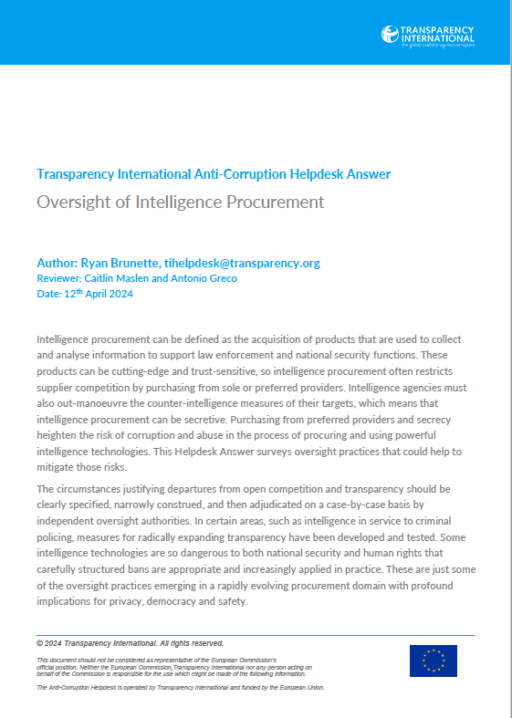
This Anti-Corruption Helpdesk brief was produced in response to a query from one of Transparency International’s national chapters. The Anti-Corruption Helpdesk is operated by Transparency International and funded by the European Union.
Query
Provide an overview of accountability and oversight mechanisms of procurement processes for the acquisition of goods and services to be used for intelligence purposes.
Summary
Intelligence procurement can be defined as the acquisition of products that are used to collect and analyse information to support law enforcement and national security functions. These products can be cutting-edge and trust-sensitive, so intelligence procurement often restricts supplier competition by purchasing from sole or preferred providers. Intelligence agencies must also out-manoeuvre the counter-intelligence measures of their targets, which means that intelligence procurement can be secretive. Purchasing from preferred providers and secrecy heighten the risk of corruption and abuse in the process of procuring and using powerful intelligence technologies. This Helpdesk Answer surveys oversight practices that could help to mitigate those risks.
The circumstances justifying departures from open competition and transparency should be clearly specified, narrowly construed, and then adjudicated on a case-by-case basis by independent oversight authorities. In certain areas, such as intelligence in service to criminal policing, measures for radically expanding transparency have been developed and tested. Some intelligence technologies are so dangerous to both national security and human rights that carefully structured bans are appropriate and increasingly applied in practice. These are just some of the oversight practices emerging in a rapidly evolving procurement domain with profound implications for privacy, democracy and safety.
Main Points
- Intelligence procurement often involves secrecy and restriction of competition, which carries risks of corruption and abuse.
- The sphere of legitimate secrecy and circumstances justifying restriction of competition should be construed narrowly and approved by an independent authority.
- In relation to criminal intelligence, there is scope for dramatic expansion of transparency and for representative legislatures to play a role in approving procurements.
- In security intelligence, where secrecy and restriction of competition may be more justified, similar processes of authorisation can proceed through independent expert oversight bodies.
- There is significant movement towards bans and similar restrictions on the purchase of intelligence products.
Contents
Background
Basics of Intelligence Oversight
Strengthening Oversight of Intelligence Procurement
The Use of Procurement to Regulate the Intelligence Technology Market
References
Authors
Ryan Brunette
Reviewed by
Caitlin Maslen (TI)
Antonio Greco (TI)
Date
03/05/2024

